PRAGUE’S FIRST CZECH CHEFS
EACH WITH A MICHELIN STAR
text ©2012
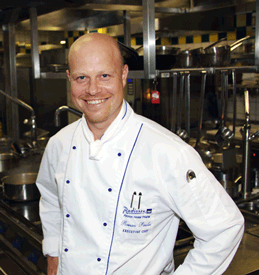
Roman Paulus
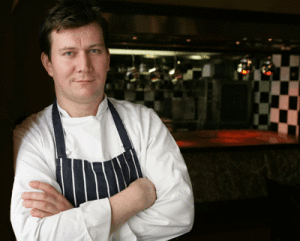
Chef Oldrich Sahajdak
In March, 2012 the prestigious Michelin Guide: Main Cities of Europe awarded two restaurants in Prague: La Degustation Bohême Bourgeoise and the Alcron of the Hotel Radisson Blu Alcron one Michelin star each. The exceptionality of this award lies in the fact that both restaurants are run by Czech chefs. La Degustation Bohême Bourgeoise has been led by chef Oldrich Sahajdák since 2006, and Alcron by Roman Paulus since 2008.
Oldrich Sahajdák is a co-founder and co-owner of the Degustation Bohême Bourgeoise. He gained experience in Germany, Italy, Portugal, New Zealand (picking fruit to improve his English), and at the culinary Institute of America (C.I.A.). His 40-seat La Degustation Bohême Bourgeoise is the first degustation restaurant in the Czech Republic. It specializes in 6 or 11-course tasting menu suppers (it’s open at lunch too from Tuesday through Thursday) inspired by traditional Czech recipes and prepared using modern gastronomic procedures. Wine pairings are optional. Like the food, all the wines are Czech.
Roman Paulus started his career at the beginning of the 1990s. Before he settled in Prague, he traveled throughout Austria, worked in the famous Savoy Hotel in London, and on the luxurious Queen Elizabeth II cruise ship. He came to the Alcron Restaurant, which specializes in seafood, from the Prague Hilton Hotel. He was Cook of the Year 2009/10.
Our Rome Bureau Chief, Lucy Gordan, met with them both in August during a press trip to Prague and northern Bohemia organized by Czech Tourism of New York City.
Our tastes in food are closely connected to our childhood; what are your first memories of food?
RP: Strawberries with cream at our summer cottage.
OS: Probably pralines, a kind of bonbon. Like all kids, I loved sweets. I‘d open the fridge to search for sweets. I was obsessed with sweets. Both my grandmothers were great cooks. What I remember from when I was little was that at our weekend house in our village in northern Bohemia, there were always a lot of children and that during holidays or the summer everyone ate together at one table. I don’t remember what we ate, but I do remember how happy I was then because we were all sitting together with lots of delicious food and eating with our hands. This is my first memory of food.
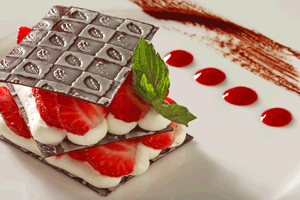
Paulus’s Strawberries Mille Feuille with mascarpone and bitter-sweet chocolate
When and why did you decide to become a chef?
RP: From early childhood I knew that I wanted to become a chef. As a small boy I read the newspaper column of a famous Czech chef, Mr. Jaromír Trejbal. He had worked many years at the Ritz in Paris before returning to Prague. Finally I wrote him a letter asking to meet him and he agreed. He was around 80 and I was 12. His engaging stories inspired me; that was exactly the moment when I decided to become a chef. I have never regretted that decision. First came the childhood inspiration but with each passing year years I have come to love the dynamicity of my profession more and more.
OS: Actually I never considered any other profession. I always wanted to be a chef probably because my mother is a chef; my grandmother is a chef too. I grew up in a kitchen. They didn’t have restaurants because I grew up during the communist regime when it was not possible to own a restaurant. They didn’t work in restaurants; my grandmother worked in a school kitchen; her daughter, my mother, in a kind of small bistro. Both worked in Prague. My father’s mother was also a chef.
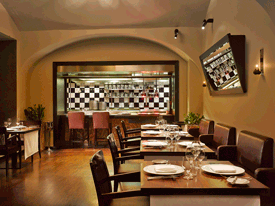
Sahajdak’s La Degustation Bohême Bourgeoise
I found only a short summary of your career up to now on the Internet. I know you worked in Germany and Italy; can you give me more details.
OS: I worked in Germany for over two years 1995-98: close to Frankfurt-an-Main the first year and the second year near Munich in Parsberg at a small family hotel also named “Parsberg.” In Italy I only worked for two weeks; it was like a course. It was also a small family-run restaurant close to Bologna; a friend of mine worked there. I called him and went there. I think it was called “San Sisto” or something like that.
You interned at La Pergola in Rome, where I live. I have interviewed Heinz Beck several times and know him quite well. How long were you in Rome and what was it like to work for him?
RP: I was there only for a week and was not a real part of the kitchen. I was just observing and learning what I could. I went to La Pergola because at the time I was working at the Hilton in Prague, which made it not so hard to be accepted at the Hilton in Rome. I admire how Beck has adapted the Italian style of cuisine.
Who were your mentors and what did you learn from them?
RP: Verner Matt. I worked with him for two years at the Vienna Hilton Plaza. The most important thing I learned from him was how to approach my guests.
OS: I don’t have a mentor. I’m self-taught. The more I cooked, the more I liked it. I was twenty-one when I came back from abroad and I still had a lot to learn, so I started to take courses. For example, I went to the United States for two weeks to study at the CIA (Culinary Institute of America). The courses I took made me what I am now. Learning slowly, step by step.
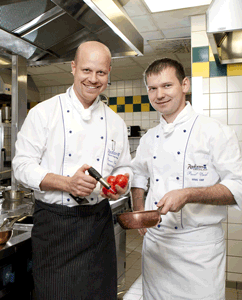
Roman Paulus with Sous Chef Pavel Vacek
What are the essential qualities of a top chef?
RP: The most essential skill is to build a successful team and to exude positive energy.
OS: Actually I don’t see myself as a top chef. I just see myself as someone who enjoys his profession so I’m very lucky. I’m surrounded by very talented people; they believe in me and follow what I tell them to do. To be a top chef, you have to be lucky like me, and work very hard. I work at least 12 hours every day. You can be creative, but, if you work with the wrong people, your creativity is for nothing. This is why I say teamwork is most important.
Other chefs you admire?
RP: Everyone who wants to do his or her work properly and to create something special.
OS: Pavel Pospišil, the first Czech chef to be awarded a Michelin star.
What do you like best about your work?
RP:I like everything that’s connected with cooking.
OS: I like to work with people who believe in what they do, so this profession is perfect for me. I also like taking a carrot, turning it into something beautiful and delicious so that people adore it.
I like to take ordinary things and turn them into something special and unique.
The least?
RP: The paperwork.
OS: The pressure; we work always under pressure. It takes me a long time at the end of a long day to calm myself down again. I don’t have a bad temper so, when I work with my colleagues, I’m calm and I don’t scream and yell because we have an open kitchen here and no one is supposed to scream. If someone has a bad temper, he can’t work with us. We are all good friends. We work under pressure because a lot of people show up at once and the orders come in very fast, so we have to be perfect at what we do. That’s why at the end of the day I’m exhausted and it takes me at least two hours to unwind.
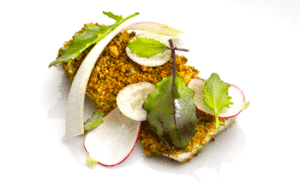
Sahajdak’s chicken and semolina pudding (click here for recipe)
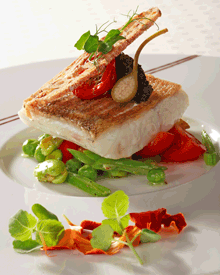
Paulus’s fried pike-perch fillet
What’s your culinary philosophy?
RP: It can be summarized in our new motto – We love to make people happy.
OS: We cook Czech cuisine. This means we take old recipes and try to turn them into something modern. We don’t have the equipment they used to have two hundred years ago, so we prepare old recipes with modern techniques. We prepare only seasonal dishes. You won’t find strawberries here at “Degustation” in January for example. Most farmers around Prague are vendors so we buy from them. Our philosophy is to buy the freshest ingredients in season and to turn them into a perfect dish so that, when you eat it, you will have a happy memory.
In a nutshell, how would you define your cuisine?
RP: Modern, light gastronomy with an individual approach to each client. Our meals have to taste as well as entertain.
OS: Local seasonal, fresh, light, cuisine, influenced by home cooking. We also go to the forest to pick mushrooms and berries. A meal in our restaurant has to be fun. When you come here, you have to smile and you have to be happy with whatever you eat.
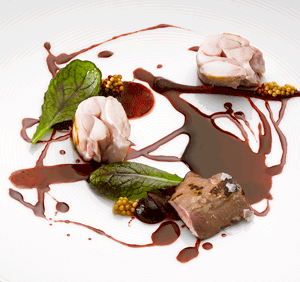 Sahajdak’s rabbit with lard, beetroot essence and mustard |
You adapt many of your recipes from a cookbook by Marie B. Svobodová. Who was she?
OS: I don’t really know. I found this book by accident in a general antique store, not one specializing in books, in a neighborhood of Prague where there are many antique stores. Until then I’d never heard of her. This book is more of a teaching manual than a cookbook with recipes. It is organized by ingredient, gives advice on how to improve certain dishes, how to preserve ingredients. For example rabbit; she tells the reader how to work with rabbit, how to skin it, how to store its meat, and what side dishes to serve it with. In the case of rabbit, she says: “Rabbit is always good with beetroot.” It was published in 1894, so it’s written in old Czech and sometimes we don’t understand what she means. There are also many ingredients that don’t exist anymore like river oysters, beaver… This book has no recipes so we use family recipes that have been handed down for generations in our families. I have five copies of this book but this is the copy we use in the kitchen. You can see all my marginal notes and Post-Its.
Do you collect cookbooks?
OS: Yes, I do, but mostly modern ones by the best chefs in the world today like Thomas Keller, Heston Blumenthal, and Pavel Pospišil.
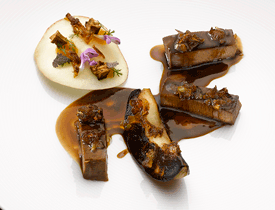
Sahadjak’s smoked beef tongue with marjoram, apple and yellow pea purée
Have you ever published a cookbook?
OS: Once, about three or four years ago, six of us published a cookbook, only in Czech, with our fathers. We printed only a few copies so it sold out very quickly. There’s too much work involved to think about writing another for now. Maybe later.
You have a restaurant in New York, “Hospoda,” where is it? Do you serve the same dishes there?
OS: The company I work for, “Ambi,” opened a restaurant in New York. They have a chef de cuisine there; I’m the consulting chef. My duties are to go to New York four or six times a year to make sure that they are doing all the right things. Their menu is similar to ours except that here in Prague we only offer two tasting menus with small portions. In New York the portions are bigger, but each dish tastes like the one we serve here. “Hospoda” means pub; it’s on the Upper Eastside, on 73rd Street between First and Second Avenues in the Bohemian National Hall, which belongs to the Czech Government.
What are your signature dish and other specialties?
RP: Lobster bisque – it is not my personal dish, but it is an Alcron dish, which has been a
specialty here since the restaurant opened in the 1930’s. I personally prefer risotto – simple and very tasty. My specialty is a chanterelle mushroom risotto with grilled tiger prawns and fresh arugula.
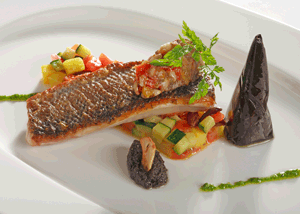
Paulus’s filet of Sea Bass
OS: We change the menu almost daily, but we have a few dishes that we are especially proud of and stay on the menu: smoked beef tongue, which we treat in the same way that Prague ham is smoked. This means that we marinate the tongue for at least three weeks. Then we boil the meat until it’s tender. Then we smoke it for two hours and then we cook it again. It’s a long and difficult process, but in the end it’s worth it. The idea came from Svobodová’s book. She says: “If you serve the beef tongue with a chickpea purée, you’ll be fine.” We use pea purée instead, because chickpeas don’t come from here.
You are the first two Czech-born chefs to be awarded a Michelin star. What are the reasons for your success?
RP:I think that it is because I have stayed true to my principles – cook only using the best and freshest ingredients, am positive and work to the best of your ability.
OS: As I told you before, we are not the first. The first one was Mr. Pavel Pospišil. He immigrated to Germany, so he got his star in Germany in 1984 or somewhere around then. He was the first Czech to get a Michelin star. His restaurant is somewhere close to Strasbourg on the border between France and Germany. I never worked with him. I met him just once.
The reason for my success is probably because my team and I are doing our job in the proper way.
As you can see from my website, I have interviewed many chefs. Most have their own restaurants, but two in particular, Peter Knogl in Basel and Heinz Beck in Rome, like you, have top restaurants in top hotels. They both told me they prefer that because it allows them to put all their energy into their dishes. Do you agree, or someday do you hope to have your own restaurant? I read on the internet somewhere that your dream was to be the Executive Chef of a top hotel; is that true?
RP: Yes, I have always wanted to work in the kitchen of a top hotel.
You and Oldrich Sahajdák are the first Czech chefs to have won Michelin stars in the Czech Republic; do you feel a responsibility to put Czech food on the world map?
RP: Definitely.
OS: It would be nice. Look at Denmark. Did you hear about Nordic cuisine ten years ago? We Czechs could follow suit, but it’s still a long way off.
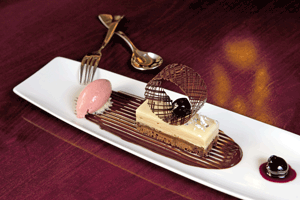
Paulus’s Caffe latte bar with milk mousse
Do you have a tasting menu of Czech specialties at Alcron?
RP: No. There is no special Czech tasting menu at Alcron. The other restaurant in the Radisson Blu Alcron Hotel – La Rotonde, specializes in Czech and International cuisine.
How do you feel about guides and food critics?
RP: When someone wants to play in the top league, he has a lot of fans as well as critics. Some of the food guides are important and worth consulting or reading.
OS: After the Michelin star, just two days afterwards, we were surrounded by journalists and clients clambering for a table, but it was just like a bubble, I think, and after a few days things turned back to normal. During the summer our guests are mostly tourists, but the rest of the year it’s 50/50 tourists and locals.
Up to now you’ve told me about Roman Paulus and Oldrich Sahajdák the chefs; I’d like to know more about Roman Paulus and Oldrich Sahajdák as people. For example, what are your favorite foods?
RP: Risotto.
OS: My own of course. I like rabbit with spinach. Ordinary, but very tasty food.
If you were in jail, on Death Row, what would you order as your last meal?
RP: The typical Czech meal – Braised beef “svícková” in creamy cranberry sauce with assorted bread dumplings.
OS: Apples.
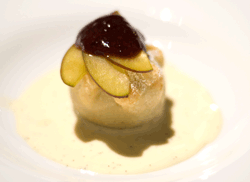
Sahajdak’s sweet bun with vanilla sauce and plum butter
A dish you dislike?
RP: Only those that are not well prepared.
OS: I eat everything.
Your favorite wines?
RP: Veltlínské zelené from Moravia.
OS: I like sweet wines from Alsace. Gewurztraminer, for example.
A favorite dessert?
RP: Czech Trhanec – a kind of cake that you tear from the baking tin into pieces when you serve it.
OS: Apple strudel.
Your favorite color, flower?
RP: Black and red – like AC Milan; dandelion.
OS: Green and orange; grass.
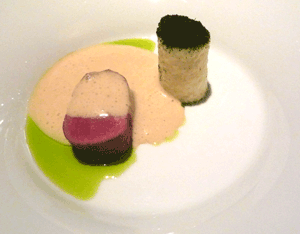
Sahajdak’s beef tenderloin in a dill sauce accompanied by a dumpling. This dish has been on La Degustation’s menu for three years
What zodiac sign are you?
RP: Aries.
OS: Cancer.
What is never missing in your home refrigerator?
RP: Cheese, olive oil, and buttermilk.
OS: Milk, fruit, vegetables, cheese and ice cream.
Chefs are well known for having collections, often of motorcycles, fast cars, or watches; what about you?
RP: Coins.
OS: Really! I’ve never heard that. I’ll have to start. I have a collection of cookbooks, a large one. They are in many languages: Czech, French, Spanish, Finnish, and Norwegian. Sometimes I don’t understand what’s written, but I like having the book in its original language. What I really collect is music. I like music so I collect scores, LPs, everything. Modern music. I change my favorite band all the time, but the Curve, Depeche Mode, Interpol, and Kasabian.
Where do you like to go on vacation?
RP: Italy, especially Florence because it’s the place in Italy that I know best. A friend of mine who was a chef at the Four Seasons here in Prague now works at the Four Seasons in Florence. Its restaurant is my favorite in Florence.
OS: As I said before, we have a weekend house in northern Bohemia in the town of Doubice on the border with Germany, so we mostly go there. Once or twice a year we go to the sea somewhere because we have a small kid and it’s good for our kid to go to the sea. I don’t have too much time off to be with my family, so whenever I’m off a few days in a row, we go somewhere to enjoy ourselves.
If you hadn’t become a chef, what other profession would you have chosen and why?
RP: Perhaps an artist, a painter.
OS: A sailor because I like to travel. I suppose when you are on the sea, there’s a quiet time, when you are waiting for the fish to bite. I like to go fishing with my father.

& & &
